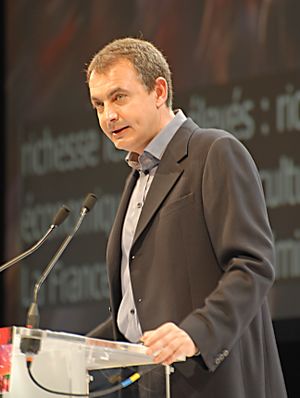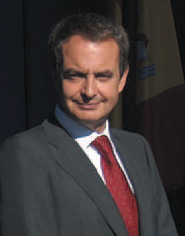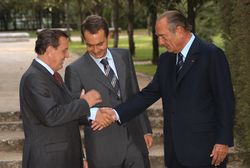خوسيه لويس رودريگث ثپاتيرو
| خوسيه لويس رودريگث ثپاتيرو José Luis Rodríguez-Zapatero | |
|---|---|

| |
| رئيس وزراء اسبانيا | |
| في المنصب 17 أبريل 2004 – 31 ديسمبر 2011 | |
| العاهل | خوان كارلوس الأول |
| نائب الرئيس | María Teresa Fernández de la Vega (أول فترة) Pedro Solbes (ثاني فترة) |
| سبقه | خوسيه ماريا أزنار |
| خلفه | ماريانو راخوي |
| زعبم المعارضة في مجلس النواب | |
| في المنصب 1 يوليو 2000 – 17 أبريل 2004 | |
| الرئيس | خوسيه ماريا أثنار |
| سبقه | Joaquín Almunia |
| خلفه | ماريانو راخوي |
| تفاصيل شخصية | |
| وُلِد | 4 أغسطس 1960 بلد الوليد، بلد الوليد، كاستيله وليون، اسبانيا |
| الحزب | PSOE |
| الدين | لاديني [1] |
خوسيه لويس رودريگـِث ثپاتيرو (فايادوليذ، 4 أغسطس 1960)، هو رئيس الحكومة الإسبانية حتى 31 ديسمبر 2011. وكان الحزب الاشتراكي بزعامة ثباتيرو قد حقق فوزا مفاجئا في الانتخابات العامة سنة 2004 بعد أن انقلب الناخبون على الحكومة على ما يبدو بسبب سوء تعاملها مع تفجيرات مدريد التي أسفرت عن مقتل 201 شخصا وإصابة نحو 1500 آخرين. وكانت استطلاعات الرأي ترجح فوز خصمه عن الحزب الشعبي خوسيه ماريا أثنار حتى وقوع أحداث مدريد.
ولد خوسي لويس في بلد الوليد في الرابع من أغسطس 1960 هو الإبن الثاني في العائلة، لديه أخ يكبره بأربع سنوات، كان والده خوان رودريكز لوزانو محامي، والدة خوسي لويس توفيت في شهر كتوبر من عام 2000. أمّا جده فقد كان قبطان في فترة الحكم الجمهوري وأعدمه القوميون في 18 أغسطس 1936 في حي جسر كاسترو خلال الحرب الأهلية الإسبانية لرفضه المشاركة في الإنتفاضة بمدينة ليون, درس خوسي لويس الإبتدائية في مدرسة ديسثيبلاس دي خسوس من عام 1966إلى 1970 وتحصّل علي البكالوريوس في المركز الخاص "معهد ليوناس".
في الخامس من أغسطس 1976 و عندما كانت الأحزاب السياسية غير شرعية، في ذلك الوقت حضر خوسي لويس خطابا للزعيم "فليب گونزاليس" تفتقت معه مواهبه السياسية.
وصل ثاباتيرو إلي سدة الحكم في إسبانيا في أبريل 2004 خلفاً لخوسيه ماريا أثنار في الوقت الذي كان الشعب الإسباني يشعر بسخط شديد لتبعيته العمياء لسياسات الرئيس الأمريكي السابق جورج بوش وإرساله الجيش الإسباني ليشارك قوات التحالف في الحرب علي أفغانستان.
مناطق نشاط سياسته الخارجية
العراق
Before being elected, Zapatero opposed the American policy in regard to Iraq pursued by former Spanish Prime Minister Aznar. During the electoral campaign Zapatero had promised to withdraw the troops if control in Iraq was not passed to the United Nations after 30 June (the ending date of the initial Spanish military agreement with the multinational coalition that had overthrown Saddam Hussein). Zapatero declared that he did not intend to withdraw the Spanish troops before that date after being questioned about the issue by the People's Party's leader Mariano Rajoy in his inauguration parliamentary debate as Prime Minister.
On 19 April 2004 Zapatero announced the withdrawal of the 1,300 Spanish troops in Iraq.[2]
The decision aroused international support worldwide, though the Bush administration claimed that terrorists could perceive it as "a victory obtained due to the 11 March 2004 Madrid train bombings". John Kerry, then Democratic party candidate for the U.S. Presidency, asked Zapatero not to withdraw the Spanish soldiers. Some months after withdrawing the troops, the Zapatero government agreed to increase the number of Spanish soldiers in Afghanistan and to send troops to Haiti to show the Spanish Government's willingness to spend resources on international missions approved by the United Nations.
On 8 June 2004, with the withdrawal already complete, Zapatero's government voted in the United Nations Security Council in favor of Resolution 1546 where the following could be read:
- "The Security Council, Recognizing the importance of international support [...] for the people of Iraq [...], Affirming the importance of international assistance in reconstruction and development of the Iraqi economy [...]
- 15. Requests Member States and international and regional organizations to contribute assistance to the multinational force, including military forces, as agreed with the Government of Iraq, to help meet the needs of the Iraqi people for security and stability, humanitarian and reconstruction assistance, and to support the efforts of UNAMI;"
United States
The relations between José Luis Rodríguez Zapatero and George W. Bush have been difficult, mostly as a result of Zapatero's opposition to the war in Iraq.
On 12 October 2003, during the Hispanic Day military parade held in Madrid, then opposition leader and presidential candidate Zapatero remained seated when a U.S. Marine Corps honour guard carrying the American flag walked past Zapatero and other VIPs. Everybody else stood as with the rest of the foreign guest armies representations.[3] He declared afterwards that his action was a protest against the war and certainly not intended as an insult to the American people.
When Zapatero became elected, American troops were instructed by their government not take part during the traditional military parade on the Spanish national holiday in 2004 and in 2005, something which they used to, as both the Spanish and American armies, as NATO allies, are part of joint humanitarian missions in places like Afghanistan and elsewhere; American troops returned to the military parade in 2006; this time Zapatero, being the Spanish premier, stood.[4]
اوروبا
Zapatero's predecessor, José María Aznar, defended a strong Atlanticist policy. Zapatero has reversed that policy in favour of a pan-European one. It has also sponsored the idea of an Alliance of Civilizations which is co-sponsored by Turkish Prime Minister Recep Tayyip Erdoğan.
In the writing of what was to be the European Constitution Zapatero accepted the distribution of power proposed by countries such as ألمانيا and فرنسا. After signing the treaty in Rome together with other leaders, he decided to call for a referendum, which was held on 20 February 2005. It was the first referendum on the EU treaty, a fact highly publicized by Zapatero's government. A 'Yes' vote was supported by the Socialist Party and the People's Party and as a result almost 77 percent voted in favour of the European Constitution, but turnout was around 43 percent. However, this result came to nothing when a referendum in France voted to reject the European Constitution which meant that the EU could not ratify the treaty because support was not unanimous.
فرنسا وألمانيا
On 1 March 2005, Zapatero became the first Spanish prime minister to speak to the French National Assembly. He supported the PS candidate Ségolène Royal during her campaign for the 2007 French presidential election.[5]
Zapatero directly supported the SPD candidate, Chancellor Gerhard Schröder, before the German election of 18 September 2005.
جبل طارق
While Zapatero complained about Gibraltar's celebrations for the tercentenary of its occupation by المملكة المتحدة and rejected the Gibraltarians' requests for Spain to recognize its right to self-determination, at the end of 2004 his policy changed and he became the first Spanish prime minister to accept the participation of Gibraltar as a partner on the same level as Spain and the المملكة المتحدة in discussions both countries hold regularly concerning the colony. The decision was criticized by many in Spain as a surrender of their right to sovereignty over Gibraltar as well as a disruption of the Treaty of Utrecht. Zapatero said it was a new way to solve a 300-year-old issue.
إسرائيل وفلسطين
وزارة ثباتيرو
المصادر
- ^ http://youtube.com/watch?v=YWgAfNVhVFo | When asked about his religious beliefs, Zapatero responds that he is agnostic at 4:27/5:40
- ^ elmundo.es - Zapatero anuncia la retirada inmediata de las tropas de Irak
- ^ Zapatero (right, bottom) seated during the Hispanic Day military parade in 2003 as the Stars and Stripes marched
- ^ El desfile del Día de la Fiesta Nacional rinde homenaje a las misiones internacionales · ELPAÍS.com
- ^ Zapatero apoya a Ségolène en Toulouse | elmundo.es videos
انظر أيضاً
وصلات خارجية
رسمية
- Spanish Socialist Workers' Party
- Web site of La Moncloa, official residence of the Spanish Prime Minister
صحافة
- The second transition, a survey of Spain by The Economist, Jun 24th 2004
- Interview published by Time Magazine, 19 Sep 2004
- Accidental Prime Minister
- Extended biography by CIDOB Foundation Español: قالب:Description/i18n
- "The real Rodriguez Zapatero"; Critic review from the Victims of Terrorism association
| مناصب سياسية | ||
|---|---|---|
| سبقه Joaquín Almunia |
Leader of the Opposition 2000 - 2004 |
تبعه Mariano Rajoy |
| سبقه خوسيه ماري أزنار |
{{{title}}} {{{start}}} – الحاضر |
الحالي |
| مناصب حزبية | ||
| سبقه Interim Political Committee |
{{{title}}} {{{start}}} – الحاضر |
الحالي |


